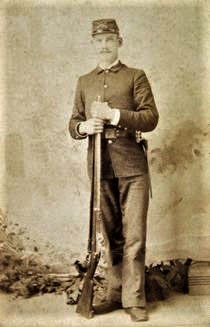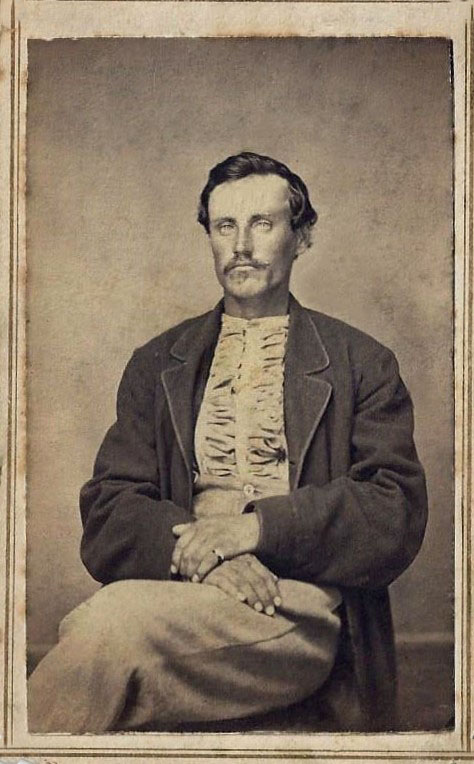RECOLLECTION
Of the
Action in the Civil War Around Chatanooga
From March 23, 1905 - North Vernon Sun
By
William B. Whitcomb, Co. B, 82nd Indiana Volunteers
Action in the Civil War Around Chatanooga
From March 23, 1905 - North Vernon Sun
By
William B. Whitcomb, Co. B, 82nd Indiana Volunteers

Pictures on this page donated from the Claude Thompson Collection by Cheryl J. Kotecki
The advance on Atlanta has been called the one hundred days' fight, and truly it was for the enemy was very stubborn, making some eight different stands, the last being Peachtree creek. Comrades, do you remember when we waded Peachtree creek to our necks? And those Jonnies so ill-mannerly as to shoot at us right in the water. If any of us had been shot through the head we might have been killed and drowned besides. We got across all right, but mad as wet hens and felt like going right after those fellows, which we did, and drove them back over the highland. The Union line of battle was soon well formed, and ready for the advance, but that fighting General Hood concluded to contest the advance. So about 1 mile to our left the real battle of Peachtree creek took place.
The writer saw this battle from a hill, just to the left of the 82nd. On hearing cannons, he looked to the east and saw the Union batteries firing into the woods in front. Soon there came forth from the woods into an open field a solid division of Hood's army at fixed bayonet, but were met by the Union forces with much vigor and such a shower of shot and shell, they broke and fell back out of sight. Thus the real battle of Peachtree creek ended...
Our next move was to cross the Chattahooche-coochie river, and advance on the fated City of Atlanta. We were placed to the right of General McPherson who fell in battle at this place. The Confederates were again defeated and fell back into their forts and earthworks about the city. The whole Union army closed in and fortified.
Here we enjoyed quiet, as there was no firing, yet we were in almost speaking distance of the enemy. Our pickets would say, "Hello there, Jonnie, have you got any tobacco?" "Yes," would come the reply, "have you got any coffee?" "Yes, come to that log and I will give you some coffee for some tobacco." So they would meet and have a visit, trade their commercial products, and say: "Good by, Jonnie." "Good by, Yank," and return to their places, perfect friends, yet tomorrow might see them face to face, in deadly conflict, each trying to kill the other, but such is war, cruel war.
It was here on one still morning a brass band on the Union side struck up "Hail Columbia." When the last note had died away a brass band in the Confederate army struck up "Dixie." Thus they played back and forth, each listening to the other, and cheering lustily. Finally the Band over there in one of the forts played, "Home Sweet Home." Did they cheer? Oh, no, but many were the tears that trickled down the cheeks of these toughened veterans. If those brave fellows could have come together there and shook hands as friends they would have ended bloodshed and carnage at once, but no, the war must go on until the Union was restored and so it did.
The next move of the Union forces was to the right, which ended in the battle of Jonesboro. This resulted in a victory for the Union forces and compelled the evacuation of Atlanta by the Confederate army. We now moved back to the city, and that famous march to the sea began. We parted with that ideal, General Geo. H. Thomas, who went back to Nashville with a strong force and completely crushed Hood's army.
General Sherman was now on the move, out into a country never before seen by a Union army, on his way to the seas. We left all communications behind us, no mail, no supplies, no nothing, except what we found on the march, which consisted of fresh meats, yams, milk and honey. You bet we fared well. This march was a pleasant one, but very little fighting. We arrived at Savannah, Ga., about Christmas, many of the boys barefooted, but the weather being mild, they did not suffer.
Boys, do you remember when we were all ordered to prepare torches and get ready for a night attack on the forts and breastworks? Gee whiz! But the writer was glad when that order was countermanded. The enemy evacuated the city and left all of the heavy cannon that night and crossed the Savannah river.
Our next move was to cross the river into South Carolina, leaving the land of goobers and yams, and into the pineries of North and South Carolina. We struck Columbia, S. C., where we witnessed the great conflagration, thence into North Carolina to Goldsboro, where we hear the glad news of General Lee's surrender. In a short time General Johnson surrendered to Sherman, Thomas annihilated Wood, and the war is over.
We moved to Richmond, thence to Washington City and formed a part of that grand review, where the largest army that was ever seen, passed in review. We were now discharged from the United States army, and boarded a freight train, were hurled over the B. & O.R.R. to Parkersburg, Va., where we embarked on a steamboat, and were landed at Lawrenceburg, Ind.
While it is a happy thought that we can again tramp the native soil of Indiana, we can but feel sad that so many are left behind. They will never return. Friends of those can only mourn, that is all.
We now went to our own capital, then scatter to the four winds, each to his home where he meets loved ones, and is filled up on all kinds of good things to eat, which by the way, makes about 9 out of 10 sick, but we will eat.
In June of this year it will be forty years since we returned. When we left Madison forty-three years ago we had 1000 strong, three-fourths of whom are now eating ambrosia with the angels. Keep up good spirits, boys, and meet each other in reunions so long as there are two of us alive.
In later wars they had their rough riders, etc., but we want it understood that we were the rough walkers of the sixties. Many of us went on foot from Louisville Ky., to Washington, D. C., except twenty miles which we rode on a train.
I now bid you good by for the present. Hoping these remembrances will interest you, I am your comrade. W. B. Whitcomb.

William B. Whitcomb
Obituary
November 21, 1912 - North Vernon Plain Dealer
WHITCOMB-William B. Whitcomb, aged 71 years, died at his home at Hayden, Saturday morning. Funeral services were conducted at the residence, Monday, by Rev. Jann, under the auspices of the Masonic Lodge. Burial took place in the Hayden Cemetery. William B. Whitcomb was born on Six Mile Creek, is Spencer Township, Jennings County, Nov. 29, 1841. His boyhood days were spent on the farm. In 1862 he enlisted in Co. B., 82nd Ind., volunteers and remained in the service until the close of the war. May 1, 1867, he was married to Caroline Wohrer, who with two sons, Fred, of Evansville, and Shepherd, of Vernon, survive him. He is also survived by a brother, Charles, a sister, Mrs. Carrie Heaton, eight grand-children and many other relatives. For a few years he was engaged in the furniture and undertaking business in Hardenburg, now Hayden, but spent most of his life on the farm where he died. He took great interest in public life and was often enlisted among the leaders in promoting such enterprises. He was three times elected trustee of Spencer Township. His path was not always strewn with roses, but the world knew nothing of his discouragements, because he always met it with a smile. This trait of character so endeared him to his many nieces and nephews that they always affectionately referred to him as "Uncle Billy," and the manner in which this reference was always made by them was so well taken and understood by their associates they they too grew to know him as Uncle Billy. He had high ideals, loved truth and was generally on the right side of a moral question. He loved the great truths and principles of Free Masonry and had been an ardent member of the order for many years. He was not a member of any church but believed firmly in the doctrine of Universalism. His death came as a shock to relatives and friends as it was thought that he was in better health than usual. But those nearest him have been leading themselves to believe that possibly there is method in it after all, for a strange uneasiness had been detected in him since the death of Levi Dolan and John Wohrer, together with whom he formed a little triumvirate of the days of 1862-64. All honor to the boys of the 82nd Regiment. We know that he loved them all but even within families there is sometimes an inner circle and so with these three, whatever was one's joy or sorrow, was the others'. And who knows but that the ties formed on the bloody fields of Chickamauga and Lookout Mountain are stronger even than the family ties formed when fields were green instead of red. Levi, a few months before he died sent John and Billy this toast,
"Here to you old pals,
May you live a thousand years
Just to keep things happy
Through this vale of tears
And may I live a thousand years
Just short one day,
Course I woundn't like to stay on earth
When you had gone away.
And who knows but that these boys, when they got this toast through him, felt it so deeply that they just had to get ready to go with their fast falling comrades, and though
John resisted the impulse for a little while, when he too was gone, what more appropriate thing could have happened than for Billy to go at once. It is a beautiful thought especially since the families
of two of the comrades are so closely related.May you live a thousand years
Just to keep things happy
Through this vale of tears
And may I live a thousand years
Just short one day,
Course I woundn't like to stay on earth
When you had gone away.
You may use this material for your own personal research, however it may not be used for commercial publications without express written consent of the contributor, INGenWeb, and